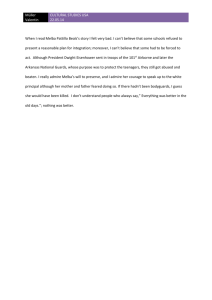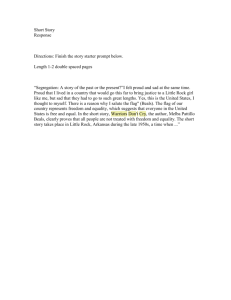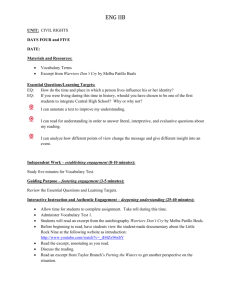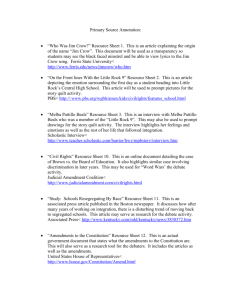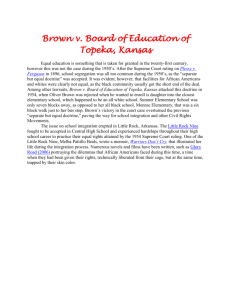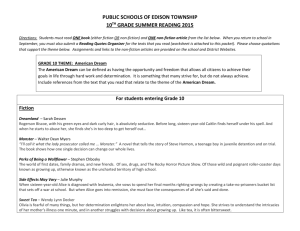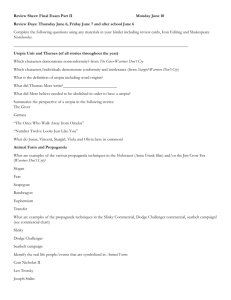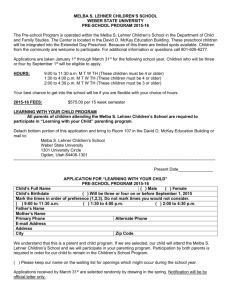9th grade Summer Reading 2013 (Honors)
advertisement
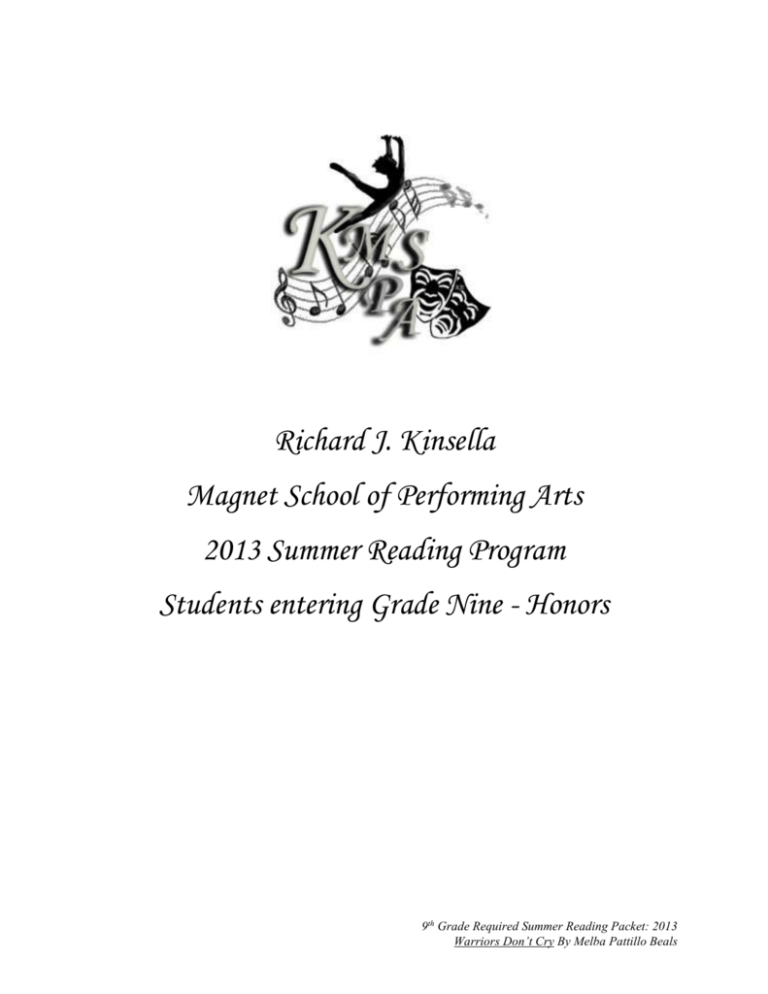
Richard J. Kinsella Magnet School of Performing Arts 2013 Summer Reading Program Students entering Grade Nine - Honors 9th Grade Required Summer Reading Packet: 2013 Warriors Don’t Cry By Melba Pattillo Beals Guidelines for Summer Reading Students are required to read a minimum of two books this summer: a selected biographical novel and a book of student choice. Students are encouraged to read beyond the minimum two novels to participate in our school wide summer reading initiative. A list to record additional books is included. Required activities for the biographical novel are included. We recognize that some students may find the book selection too challenging. If this is the case, the book can become a read aloud with a peer or an adult or make it a family read. The book and the activities should be handed in during the first week of school. Additional activities for student choice book included as well as optional graphic organizers to use during reading are located in the back of this packet. In the fall, LA teachers will collect student book activities and may assign additional activities at an appropriate grade level that will assess understanding of the book/s. The 2013 Nutmeg Nominee High School Reading List is included. Any Nutmeg book is appropriate for student choice. Students may want to get a head start on reading Nutmegs during the summer. Enjoy! 9th Grade Required Summer Reading Packet: 2013 Warriors Don’t Cry By Melba Pattillo Beals 9th Grade Required Biographical Novel: Warriors Don’t Cry By Melba Pattillo Beals 9th Grade Required Summer Reading Packet: 2013 Warriors Don’t Cry By Melba Pattillo Beals Summer Reading Assignment 2013 Warriors Don’t Cry By Melba Pattillo Beals Warriors Don’t Cry Discussion Questions 1. Why do you think that Beals starts the story by describing what her family is like? What does each family member provide for her throughout her struggles? 2. Melba’s father argued that sacrificing Melba’s life and the safety of those around her have nothing to do with freedom. Then he tells Melba, “You’re too young to be in this kind of mess.” Do you agree or disagree with Melba’s father? Explain your answers. 3. Governor Faubus was very obviously a prejudiced man who did not see African Americans as equals. Cite examples in the book to prove this. Do you think that politicians could get away with blatant racism (or other prejudices) like this today? Provide support for your answer. 4. After Melba is attacked in the bathroom (page 119), she is mostly hurt because “no part of me understood why people would do those kinds of things to one another.” From observations you have made in the book and in your own life, do you think people are born inherently good or evil? Do you think that most people will stand up for what is right, or, as in Melba’s case, will most people cowardly attack those with less power? Give evidence to support your answers. 5. Describe Melba’s relationship with Danny. What kind of a person do you think Danny was? Support your answer! What, if anything, did he do beyond his assigned duties for Melba? 9th Grade Required Summer Reading Packet: 2013 Warriors Don’t Cry By Melba Pattillo Beals 6. By Thanksgiving Melba, after enduring days of constant torture, limps quickly to class because she was advised to not “give anyone the opportunity to accuse you of being out of line.” She longs for her old friends and days of happiness. If you were in her shoes at this point, would you give up and return to your old school? Why or why not? 7. At one point Melba states that ”the segregationists had stolen yet another important piece of my life.” Explain all of the things that Melba was robbed of throughout her experiences. 8. In chapters 14-17, Melba becomes more of a warrior than ever. Explain what she does to gain some sort of control over her situation. 9. Explain your opinion of Link. Do you think he did everything possible to help Melba? Is there anything else he could have (or should have) done for her? 10. At the end of the novel, Melba reflects that “we are not separate. The effort to separate whether by race, creed, color, religion, or status is as costly to the separator as to those who would be separated.” Reflect on this statement; do you agree? How is it “costly to the separator?” 9th Grade Required Summer Reading Packet: 2013 Warriors Don’t Cry By Melba Pattillo Beals Warriors Don’t Cry Project Directions: Write and memorize a 2-minute monologue to be performed on September 30th. You can choose to write from the perspective of any historical figure from the book for the monologue. Imagine your audience is the crowd outside of Little Rock's Central High School in 1957. Your intention is to settle the crowd down. 9th Grade Required Summer Reading Packet: 2013 Warriors Don’t Cry By Melba Pattillo Beals Suggested Choice Book List Chioce books may be: - Any book that has won an award for literary merit is acceptable - Books on tape may be used - Families may read together Alexie: Flight c2007 fiction - A teenager in a new foster home wrestles with the anger and injustice of his own situation and contemplates violence before taking a jolting time travel journey to examine the conquest of Native Americans and the consequences of hatred from various viewpoints. Anderson, Laurie Halse: Twisted c2007 realistic fiction - After finally getting noticed by someone other than school bullies and his ever-angry father, seventeen-year-old Tyler enjoys his tough new reputation and the attentions of a popular girl, but when life starts to go bad again, he must choose between transforming himself or giving in to his destructive thoughts. Anderson: Feed c2002 science fiction - People in this futuristic society constantly receive information and commercials from computers implanted in their brains at birth. The story criticizes our consumer-driven society. Angelou: I Know Why the Caged Bird Sings c1991 nonfiction, autobiography - Poet Maya Angelou chronicles her early life, focusing on her childhood in 1930s rural Arkansas, including her rape at the age of five, her subsequent years of muteness, and the strength she gained from her grandmother and Mrs. Bertha Flowers, a respected African-American woman in her town. Bissinger: Friday Night Lights: A Town, a Team and a Dream c2000 nonfiction The story of a high school football team in Texas and their struggle to win the championship in 1988. Booth: Tyrell c2007 urban fiction - Fifteen-year-old Tyrell, who is living in a Bronx homeless shelter with his spaced-out mother and his younger brother, tries to avoid temptation so he does not end up in jail like his father. Bray: A Great and Terrible Beauty c2004 historical fiction, fantasy Gothic with a touch of the occult and light horror, Bray creates an adolescent heroine with present day sensibilities. The novel also provides a strong depiction of the role of women in Victorian times. Dessen: Just Listen c2006 realistic fiction - Isolated from friends who believe the worst because she has not been truthful with them, sixteen-year-old Annabel finds an ally in classmate Owen, whose honesty and passion for music help her to face and share what really happened at the end-of-the-year party that changed her life. Donoghue: Room: A Novel c2010 fiction - A 5-year-old narrates a story about his life growing up in a single room where his mother aims to protect him from the man who has held her prisoner for seven years since she was a teenager. Draper: November Blues c2007 realistic fiction - Shortly after her boyfriend Josh is killed in a pledging accident, November Nelson learns she is pregnant and fears she has no one to turn to, until she finds solace in the arms of Josh's cousin Jericho. 9th Grade Required Summer Reading Packet: 2013 Warriors Don’t Cry By Melba Pattillo Beals Fisher: Incarceron c2007 science fiction To free herself from an upcoming arranged marriage, Claudia, the daughter of the Warden of Incarceron, a futuristic prison with a mind of its own, decides to help a young prisoner escape. Huxley: Brave New World c1932 science fiction - A satirical novel about the utopia of the future, a world in which babies are decanted from bottles and the great Ford is worshipped. Satrapi: Persepolis: The Story of a Childhood c2003 nonfiction, graphic format - Contains blackand-white comic strip images in which the author shares the story of her life in Tehran, Iran, where she lived from ages six to fourteen while the country came under control of the Islamic regime. Shusterman: Unwind c2007 science fiction - Three teens embark upon a cross-country journey in order to escape from a society that salvages body parts from children ages thirteen to eighteen. Card: Ender's Game c1985 science fiction - Ender, who is the result of genetic experimentation, may be the military genius Earth needs in its war against an alien enemy. Deuker: Gym Candy c2007 fiction, sports - Groomed by his father to be a star player, football is the only thing that has ever really mattered to Mick Johnson, who works hard for a spot on the varsity team his freshman year, then tries to hold onto his edge by using steroids, despite the consequences to his health and social life. Dumas: The Count of Monte Cristo classic fiction, adventure - Nineteen-year-old French sailor Edmond Dantes is unjustly imprisoned on his planned wedding day, and after fourteen years of solitary confinement, a daring escape, hidden riches on the island of Monte Cristo, and a new identity bring him closer to a reunion with his love, Mercedes, and revenge upon his accusers. Farmer: The House of the Scorpion c2002 science fiction - In a future where humans despise clones, Matt enjoys special status as the young clone of El Patrón, the 142-year-old leader of a corrupt drug empire nestled between Mexico and the United States. Flinn: Beastly fantasy - A modern retelling of "Beauty and the Beast" from the point of view of the Beast, a vain Manhattan private school student who is turned into a monster and must find true love before he can return. Forman: If I Stay realistic fiction - While in a coma following an automobile accident that killed her parents and younger brother, seventeen-year-old Mia, a gifted cellist, weights whether to live with her grief or join her family in death. Lord: A Night to Remember nonfiction An account of the sinking of the "Titanic," a reputedly unsinkable ship that went down in the Atlantic on April 10, 1912 after hitting an iceberg, resulting in the deaths of over 1,500 people. Oppel: Half Brother historical fiction - In 1973, when a renowned Canadian behavioral psychologist pursues his latest research project--an experiment to determine whether chimpanzees can acquire advanced language skills--he brings home a baby chimp named Zan and asks his thirteen-year-old son to treat Zan like a little brother. 9th Grade Required Summer Reading Packet: 2013 Warriors Don’t Cry By Melba Pattillo Beals Stowe: Uncle Tom's Cabin classic, historical fiction - Uncle Tom, Topsy, Sambo, Simon Legree and little Eva: their names are American bywords, and all of them are characters in Harriet Beecher Stowe's remarkable novel of the pre-Civil War South. Santiago: When I Was Puerto Rican – Santiago's artful memoir recounts her childhood in rural Puerto Rico and her teenage years in New York City. These small, unadorned stories sketch the white dress she wore to close a dead baby's eyes and how she learned to sing ''America the Beautiful'' in English. Santiago's refusal to romanticize is refreshing, but it also means she doesn't worry about explaining all of Puerto Rico. When she says the sky was so dark she lit quinques, readers must either flip to the glossary or simply guess that quinques are kerosene lamps. The book leaves her in America just as she begins to escape the tenements, heading toward Harvard and her own film company. Puerto Rico is part of America, but Santiago illuminates the brilliantly hued chasm between them. Morrison: The Bluest Eye – Set in Lorain, Ohio, in 1941, The Bluest Eye is something of an ensemble piece. The point of view is passed like a baton from one character to the next, with Morrison's own voice functioning as a kind of gold standard throughout. The focus, though, is on an 11-year-old black girl named Pecola Breedlove. Pecola is spat upon, ridiculed, and ultimately raped and impregnated by her own father. No wonder she yearns to be the very opposite of what she is--yearns, in other words, to be a white child, possessed of the blondest hair and the bluest eye. Alexie: Absolutely True Diary of a Part-Time Indian – Arnold Spirit, a goofy dork with a decent jumpshot, spends his time lamenting life on the "poor-ass" Spokane Indian reservation, drawing cartoons (which accompany, and often provide more insight than the narrative), and, along with his aptly named pal Rowdy, laughing those laughs over anything and nothing that affix best friends so intricately together. When a teacher pleads with Arnold to want more, to escape the hopelessness of the reservation, Arnold switches to a rich white school and immediately becomes as much an outcast in his own community as he is a curiosity in his new one. Irving: A Prayer for Owen Meany – Owen Meany is a dwarfish boy with a strange voice who accidentally kills his best friend's mom with a baseball and believes--accurately--that he is an instrument of God, to be redeemed by martyrdom. John Irving's novel, which inspired the 1998 Jim Carrey movie Simon Birch, is his most popular book in Britain, and perhaps the oddest Christian mystic novel since Flannery O'Connor's work. Irving fans will find much that is familiar: the New England prep-school-town setting, symbolic amputations of man and beast, the Garp-like unknown father of the narrator (Owen's orphaned best friend), the rough comedy. Kingsolver: The Bean Trees – Feisty Marietta Greer changes her name to "Taylor" when her car runs out of gas in Taylorville, Ill. By the time she reaches Oklahoma, this strong-willed young Kentucky native with a quick tongue and an open mind is catapulted into a surprising new life. Taylor leaves home in a beat-up '55 Volkswagen bug, on her way to nowhere in particular, savoring her freedom. But when a forlorn Cherokee woman drops a baby in Taylor's passenger seat and asks her to take it, she does. A first novel, The Bean Trees is an overwhelming delight, as random and unexpected as real life. Kingston: The Woman Warrior – The Woman Warrior is a pungent, bitter, but beautifully written memoir of growing up Chinese American in Stockton, California. Maxine Hong Kingston (China Men) distills the dire lessons of her mother's mesmerizing "talk-story" tales of a China where girls are worthless, tradition is exalted and only a strong, wily woman can scratch her way upward. The author's America is a landscape of confounding white "ghosts"--the policeman ghost, the social worker ghost--with equally rigid, but very different rules. Like the woman warrior of the title, Kingston carries the crimes against her family carved into her back by her parents in testimony to and defiance of the pain 9th Grade Required Summer Reading Packet: 2013 Warriors Don’t Cry By Melba Pattillo Beals 9th Grade Required Summer Reading Packet: 2013 Warriors Don’t Cry By Melba Pattillo Beals Choice Book Project Please complete the following project with your choice book. This project/s should be handed in to your language arts teacher by September 30. Dual Response Journal: The purpose of the dual-response journal is to record your interactions with the text as you progress through the book. It is a way of recording your responses, positive or negative, and to track your reading through the story. Don’t simply summarize what happens in the story, but rather responds, reflect, and track your thoughts. Select 5 passages or quotes from your summer reading book to respond to, either in a notebook or in a computer document. Divide the page in half. Title the column on the left: “Passages from the Text.” Title the column on the right: “Responses to the Text.” Copy each passage word for word into the left column. Jot down the page number that indicates where the passage is located in the text. Respond to the quote in the right column. Explain why the quote is important to the plot, setting, characters or theme of the novel. Choice Book Essay Directions: After reading your book, write a two-page, typed essay (or four pages handwritten) to one of the following questions using at least three examples from the text. Use your book to help form your opinion. Not every essay question will apply to your choice book, so be selective when you choose which question to answer. Choice 1 - Class Issues: Think about the role that social class plays in the novel that you've read. What social classes are represented in the novel? To what extent is each class depicted? Are all the classes given equal representation? As you go through your novel, consider two important questions: how does the author feel about the different social classes, and how can you tell the author's opinion? Write a paper that explores the way that social class and class issues affect the characters and plot of your novel. Choice 2 - Gender Issues. Consider the gender of the characters in your novel. How are male and female characters portrayed? How does the novel portray their roles in society? How does gender influence the choices that are available to the characters and the decisions that they make? Write a paper that explores how gender affects the plot and character development in the novel. 9th Grade Required Summer Reading Packet: 2013 Warriors Don’t Cry By Melba Pattillo Beals The graphic organizers on the following pages can be used to help students monitor their comprehension while reading. 9th Grade Required Summer Reading Packet: 2013 Warriors Don’t Cry By Melba Pattillo Beals 9th Grade Required Summer Reading Packet: 2013 Warriors Don’t Cry By Melba Pattillo Beals 9th Grade Required Summer Reading Packet: 2013 Warriors Don’t Cry By Melba Pattillo Beals 9th Grade Required Summer Reading Packet: 2013 Warriors Don’t Cry By Melba Pattillo Beals 9th Grade Required Summer Reading Packet: 2013 Warriors Don’t Cry By Melba Pattillo Beals Summer Reading Log Each time you read a book and complete a project or activity, record your book on this list. Bring this list to your language arts teacher during the first week of school. Name: Book Title Author Genre 9th Grade Required Summer Reading Packet: 2013 Warriors Don’t Cry By Melba Pattillo Beals If you have any questions about the summer reading program, please do not hesitate to email me. I will be available throughout the summer. Dennis Rizzo Dennis.rizzo@hartfordschools.org Happy Summer Reading! 9th Grade Required Summer Reading Packet: 2013 Warriors Don’t Cry By Melba Pattillo Beals
